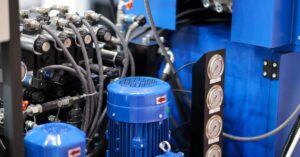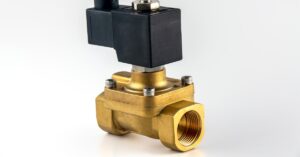Water is one of the world’s most valuable resources, and managing its flow efficiently has become a global priority. Traditionally, solenoid-operated water valves have served as the backbone of fluid control, enabling everything from dishwashers to industrial cooling systems. Today, however, a new layer of intelligence is being added: artificial intelligence (AI). By pairing solenoids with AI-powered monitoring and decision-making, businesses and cities are unlocking smarter, more efficient, and more sustainable water management systems.
Solenoids: The Mechanical Core
Solenoids work by converting electrical energy into mechanical motion, allowing a plunger to open or close a valve. This simple yet powerful technology has been the standard for decades, enabling precise on/off control of water flow in countless applications. But until recently, solenoids were limited to responding to simple electrical signals—without the ability to “think” or adapt to changing conditions.
AI Transforms Water Valves
AI bridges that gap by giving solenoid valves the ability to operate as part of intelligent, data-driven systems. Instead of being triggered by a fixed signal, an AI-enhanced water valve can receive real-time data from sensors—such as flow rate, pressure, water quality, and demand forecasts—and adjust accordingly.
This combination unlocks several groundbreaking capabilities:
- Predictive control: AI can anticipate water demand or pressure fluctuations and activate solenoids preemptively, reducing strain on infrastructure.
- Leak detection: By analyzing irregular flow patterns, AI can detect leaks or anomalies, instantly closing a solenoid valve to prevent water loss or damage.
- Energy efficiency: Smarter valve operation reduces unnecessary pumping, lowering energy costs.
- Adaptive irrigation: In agriculture, AI-guided solenoids can respond to soil moisture, weather forecasts, and crop needs to optimize water use.
- Smart cities: Municipal water networks can deploy AI-enabled solenoid valves to dynamically reroute or conserve water during peak usage or emergencies.
Market Implications
The global smart water management market is growing rapidly, and solenoids remain the physical “hands” of this digital transformation. Companies integrating AI into valve systems are creating new opportunities in industries such as
- Agritech: Precision irrigation for sustainability
- Industrial automation: Reducing water waste in manufacturing
- Building management: Intelligent plumbing and HVAC systems
- Utilities: Predictive maintenance for citywide water networks
The Road Ahead
As AI and IoT (Internet of Things) technologies mature, solenoid valves will no longer be seen as simple mechanical components. Instead, they’ll become smart endpoints in a network of sensors, controllers, and analytics engines—quietly ensuring that water is delivered safely, efficiently, and sustainably.
In short, solenoids and water valves are evolving from passive devices into active participants in intelligent water systems, with AI driving the change. The next time you see a faucet turn on or an irrigation system spring to life, it may be powered not just by electricity, but by artificial intelligence.






